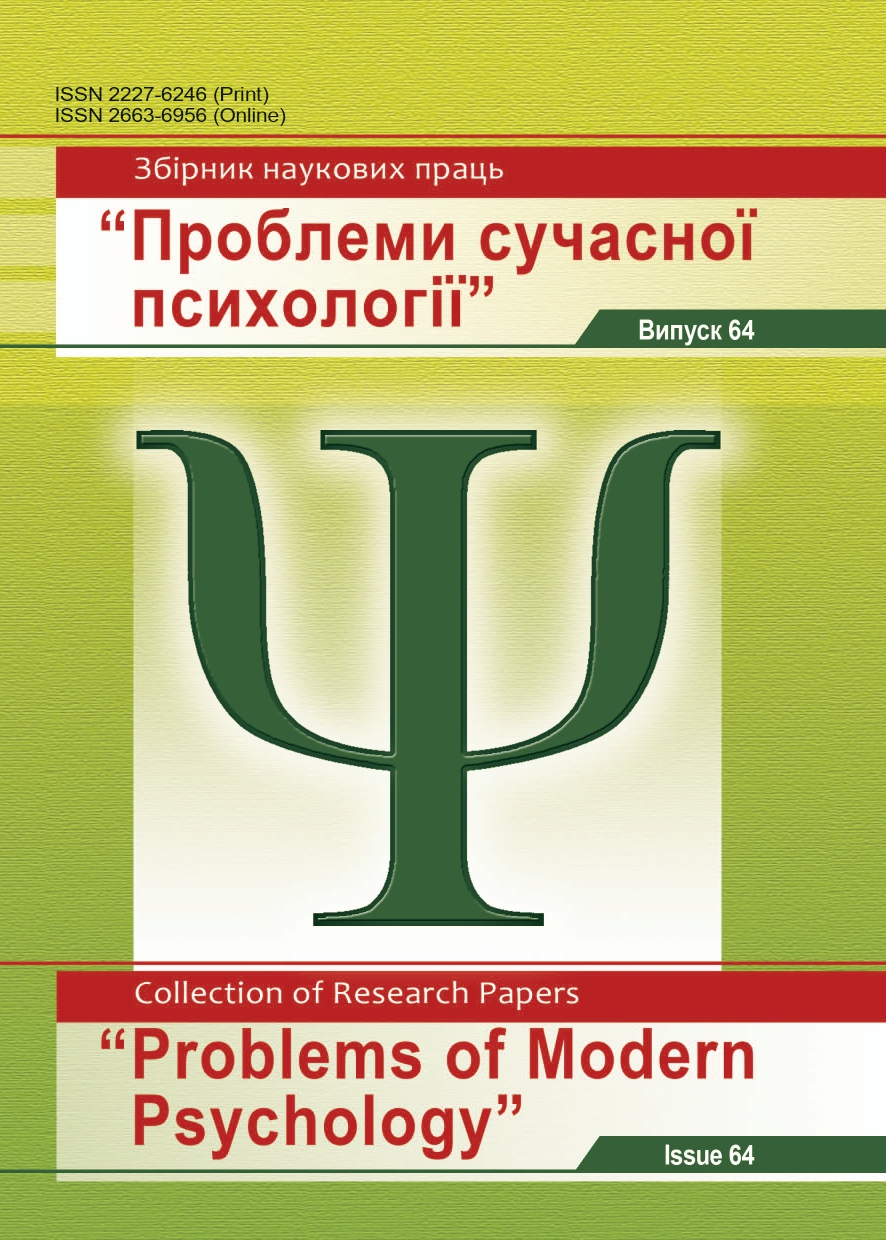Types of Parental Attitude towards Children as a Way to Achieve Adaptive Family Relationships
DOI:
https://doi.org/10.32626/2227-6246.2024-64.69-90Keywords:
adaptive family relationships, parental attitude, emotional rejection, overprotection, treatment by a double bind type, indulgent hyperprotection, dominant hyperprotection, increased moral responsibility, cruel treatment, neglectAbstract
The purpose of this article is to study types of parental attitude towards children as a way to achieve adaptive family relationships.
Methods of the research. The following theoretical methods of the research were used to solve the tasks formulated in the article: a categorical method, structural and functional methods, the methods of the analysis, systematization, modeling, generalization. A pilot research was used as the empirical method.
The results of the research. Children of parents with a controlling type of upbringing were obedient, suggestible, fearful, not too persistent in achieving their own goals, non-aggressive. With a mixed style of upbringing children are characterized by suggestibility, obedience, emotional sensitivity, non-aggressiveness, lack of curiosity, originality of thinking and poor imagination. So, we distinguished three types of parental attitudes that are pathogenic for the emotional development of the child: 1. Emotional rejection is the indifferent attitude towards the child, it shows the parents’ unwillingness to satisfy the child’s physical and mental needs, a desire to spend more time without him/her. This also includes cruel treatment, when, along with indifference, parents inflict physical injuries on the child. The reasons are financial difficulties, marital conflicts and mental infantilism of the child. 2. Overprotection is often such style of treatment of the child, which covers up an unconscious rejection of him/her. A feeling of guilt, in the connection with this rejection, often is arisen in parents’ psyche whose child is often and seriously ill. 3. Treatment of the child by a double bind type. The child is completely (and emotionally) dependent on the parents.
Conclusions. The classification of parental attitudes towards children suffering from neuroses, neurosis-like conditions, psychopathies and character accentuationswas proposed: 1. Indulgent hyperprotection: the child is the center of attention of the family, and the family strives to satisfy his/her needs as fully as it is possible. 2. Dominant hyperprotection: the child is the center of attention of the parents, who spend a lot of time and energy to him/her, while depriving him/her of independence, setting numerous restrictions and prohibitions. 3. Emotional rejection: ignoring the child’s needs, often cruelty to him/her. 4. Increased moral responsibility is in education, increased moral demands are combined with inattention and lack of care on the part of the parents. 5. Cruel treatment includes parents do not strive to satisfy the needs of the child, but at the same time practice cruel punishments for the slightest offenses. 6. Neglect: the child is left to his/her own devices, the parents are not interested in his/her personality and do not control him/her. Lack of care and control are perceived by us as hypoprotection.
Downloads
Published
How to Cite
Issue
Section
License
Copyright (c) 2024 Kharchenko Nataliia

This work is licensed under a Creative Commons Attribution-NonCommercial 4.0 International License.
Copyright
The Editorial Board has the full right to publish original scientific papers containing results of theoretical and experimental research works which are not currently subject to review for publication in other scientific editions. The Author shall transfer to the editorial board of the Collection the right to spread the electronic version of the paper, as well as the electronic version of the paper translated into English (for papers originally submitted in Ukrainian and Russian) by all kinds of electronic means (placement at the official website of the Collection, electronic databases, repositories etc).
The Author of an article reserves the right to use materials of the paper, without approval with the editorial board and the founders of this Collection: a) partially or fully, for educational purposes; b) for writing own dissertation papers; c) for preparation of abstracts, conference reports and presentations.
The Author of an article can place electronic copies of the paper (including the final electronic version downloaded from the official website of the Collection) at:
- personal web resources of all Authors (websites, webpages, blogs etc.);
- web resources of the institutions where the Authors are employed (including electronic institutional repositories);
- non-profit public access web resources (for example, arXiv.org).
But in all cases, it is obligatory to have a bibliographic reference to the paper, or a hyperlink to its electronic copy placed at the official website of this Collection.






